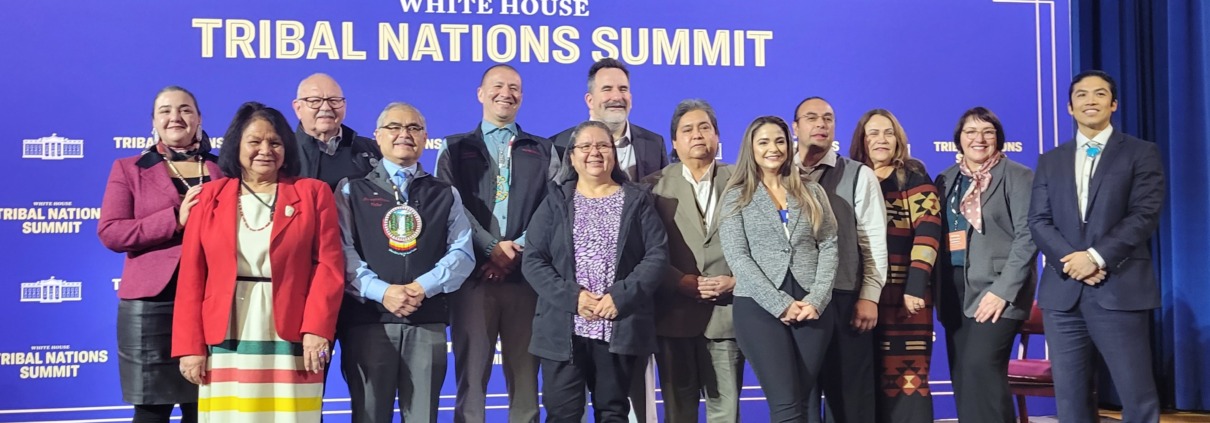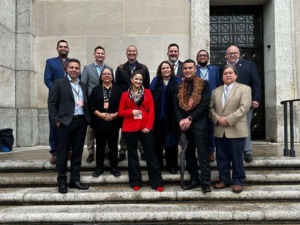Suquamish Tribe applauds new White House plans to bolster collaboration with Tribes
New initiatives expand consultation and support for critical needs in Indian Country
Suquamish Tribe Chairman Leonard Forsman hailed several new initiatives announced at the 2022 White House Tribal Nations Summit this week where he and other tribal leaders gathered with President Joe Biden, Vice President Kamala Harris, and numerous agency heads.
“The President’s statement on protection of tribal sovereignty and treaty rights was a highlight of this year’s summit,” said Forsman, who is also the President of the Affiliated Tribes of Northwest Indians. “The President spoke of respect for tribes as nations and treaties as law. He made this a cornerstone of his Indian Policy.”
Among the new initiatives are several aimed at strengthening tribal participation in management of federal lands and waters. Among them:
- The U.S. Commerce Department will join efforts with the U.S. Agriculture and Interior departments to co-steward lands and waters that have cultural and natural resource importance to tribal communities.
- The Interior Department will bolster consultation with federally recognized tribes to assure government-to-government discussions take place before decisions are made, aiming towards consensus agreements. Decision makers are required to invite tribes to engage in consultations and keep records of discussions.
- A new presidential memorandum requires all relevant federal agencies to get annual training on the tribal consultation process.
Suquamish Tribe Chairman Leonard Forsman (top row, middle right) was among the tribal leaders attending the 2022 White House Tribal Nations Summit.
“Consultation has to be a two-way, nation-to-nation exchange of information,” said Biden in his address to tribal leaders gathered for the summit. “Federal agencies should strive to reach consensus among the tribes.”
Tribal nations, added Biden, “should know how their contributions influenced the decision-making.”
Supporting protection of lands and waters
Forsman applauded the administration’s commitment to working with tribal nations.
“The administration’s stance gives the Suquamish and other Northwest tribes more leverage in our continuing efforts to protect our waters and lands from pollution and harmful development,” said Forsman. “This policy also bolsters our fight against unconstitutional attacks on our sovereignty in the courts as seen in the Brackeen and Castro-Huerta cases, both of which were recently taken up by the U.S. Supreme Court.”
Also at the summit, the Biden administration announced a new agreement on access to electromagnetic spectrum for tribal nations, as well as deployment of broadband and other wireless services on tribal lands.
The administration promised assistance to tribes for transitioning to clean energy, including federal government purchases of carbon-free energy generated by tribal producers. Agency heads also committed to including tribal nations in the administration’s electric vehicle initiative.
Critical funding for health care, climate impacts
The administration also promised $9.1 billion for Indian Health Services. Health care services are required in tribal treaties with the U.S. government. The funding will be “mandatory” instead of varying depending on budget years, insulating tribal health services from the uncertainties that hinder consistent health care services to Tribal communities.
Meanwhile, the administration promised to help tribes survive the impacts of a changing climate. $135 million will help 11 tribal communities relocate in the wake of rising waters associated with melting glaciers and ice caps. Funds will come from the Bipartisan Infrastructure Law and Inflation Reduction Act, as well as from FEMA and the Denali Commission.
“As part of the federal government’s treaty and trust responsibility to protect tribal sovereignty and revitalize tribal communities, we must safeguard Indian Country from the intensifying and unique impacts of climate change,” said Interior Secretary Deb Haaland (Laguna Pueblo), who joined tribal leaders at the summit.
“On a personal note,” said Forsman, “it brought me great joy and pride to see the numerous high-level, American Indian federal appointees – including Secretary Deb Haaland – who understand Indian Country. The cultural presentations woven into the summit reminded us all of our responsibilities to preserve our native languages and culture.”



